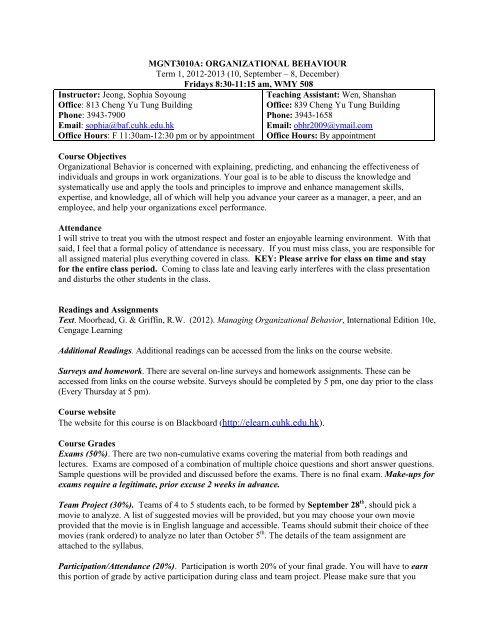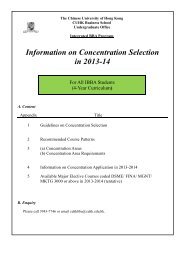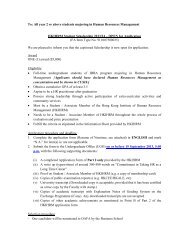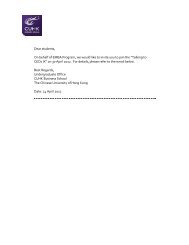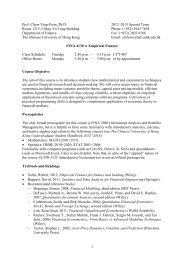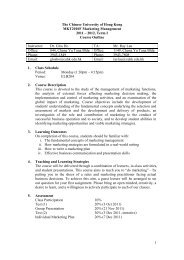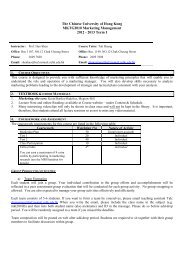organizational behaviour - The Chinese University of Hong Kong
organizational behaviour - The Chinese University of Hong Kong
organizational behaviour - The Chinese University of Hong Kong
You also want an ePaper? Increase the reach of your titles
YUMPU automatically turns print PDFs into web optimized ePapers that Google loves.
MGNT3010A: ORGANIZATIONAL BEHAVIOUR<br />
Term 1, 2012-2013 (10, September – 8, December)<br />
Fridays 8:30-11:15 am, WMY 508<br />
Instructor: Jeong, Sophia Soyoung<br />
Office: 813 Cheng Yu Tung Building<br />
Phone: 3943-7900<br />
Email: sophia@baf.cuhk.edu.hk<br />
Office Hours: F 11:30am-12:30 pm or by appointment<br />
Teaching Assistant: Wen, Shanshan<br />
Office: 839 Cheng Yu Tung Building<br />
Phone: 3943-1658<br />
Email: obhr2009@ymail.com<br />
Office Hours: By appointment<br />
Course Objectives<br />
Organizational Behavior is concerned with explaining, predicting, and enhancing the effectiveness <strong>of</strong><br />
individuals and groups in work organizations. Your goal is to be able to discuss the knowledge and<br />
systematically use and apply the tools and principles to improve and enhance management skills,<br />
expertise, and knowledge, all <strong>of</strong> which will help you advance your career as a manager, a peer, and an<br />
employee, and help your organizations excel performance.<br />
Attendance<br />
I will strive to treat you with the utmost respect and foster an enjoyable learning environment. With that<br />
said, I feel that a formal policy <strong>of</strong> attendance is necessary. If you must miss class, you are responsible for<br />
all assigned material plus everything covered in class. KEY: Please arrive for class on time and stay<br />
for the entire class period. Coming to class late and leaving early interferes with the class presentation<br />
and disturbs the other students in the class.<br />
Readings and Assignments<br />
Text. Moorhead, G. & Griffin, R.W. (2012). Managing Organizational Behavior, International Edition 10e,<br />
Cengage Learning<br />
Additional Readings. Additional readings can be accessed from the links on the course website.<br />
Surveys and homework. <strong>The</strong>re are several on-line surveys and homework assignments. <strong>The</strong>se can be<br />
accessed from links on the course website. Surveys should be completed by 5 pm, one day prior to the class<br />
(Every Thursday at 5 pm).<br />
Course website<br />
<strong>The</strong> website for this course is on Blackboard (http://elearn.cuhk.edu.hk).<br />
Course Grades<br />
Exams (50%). <strong>The</strong>re are two non-cumulative exams covering the material from both readings and<br />
lectures. Exams are composed <strong>of</strong> a combination <strong>of</strong> multiple choice questions and short answer questions.<br />
Sample questions will be provided and discussed before the exams. <strong>The</strong>re is no final exam. Make-ups for<br />
exams require a legitimate, prior excuse 2 weeks in advance.<br />
Team Project (30%). Teams <strong>of</strong> 4 to 5 students each, to be formed by September 28 th , should pick a<br />
movie to analyze. A list <strong>of</strong> suggested movies will be provided, but you may choose your own movie<br />
provided that the movie is in English language and accessible. Teams should submit their choice <strong>of</strong> thee<br />
movies (rank ordered) to analyze no later than October 5 th . <strong>The</strong> details <strong>of</strong> the team assignment are<br />
attached to the syllabus.<br />
Participation/Attendance (20%). Participation is worth 20% <strong>of</strong> your final grade. You will have to earn<br />
this portion <strong>of</strong> grade by active participation during class and team project. Please make sure that you
<strong>Chinese</strong> <strong>University</strong> <strong>of</strong> <strong>Hong</strong> <strong>Kong</strong> MGNT3010A<br />
Sophia S. Jeong Fall 2012<br />
display your name card during class to get the participation grade.<br />
1. Class participation (15%). Your in-class participation is important and critical part <strong>of</strong> this class<br />
for it stimulates your own learning and that <strong>of</strong> the other students. I therefore expect you to be<br />
prepared, attend, and be actively involved in all class activities and discussions. An informed and<br />
meaningful participation in class discussion will be graded favorably. Survey completion and<br />
forum discussions are also counted towards class participation.<br />
Perfect attendance but no participation will earn you only 50% <strong>of</strong> the points in this<br />
category. Three non-crisis incidents <strong>of</strong> absence, tardiness, or early departure result in an<br />
automatic 0 on attendance. Crises are defined by involvement <strong>of</strong> deans or medical personnel.<br />
2. Participation in your team project (5%). Participation in your team project will be judged by<br />
your fellow team members. Your fellow team members will assign you a participation grade<br />
from 0 to 5.<br />
In sum, your final grade is determined as follows:<br />
Test #1<br />
Test #2<br />
%<br />
50<br />
Team project 30<br />
Participation/Attendance/Peer Evaluation 20<br />
Total 100<br />
<strong>The</strong> university guidelines suggest that about 25% <strong>of</strong> students will receive an A or A- and about 15% will<br />
receive C+ or below. Pr<strong>of</strong>essors are strongly recommended to follow the guidelines.<br />
Other Items<br />
Students should turn <strong>of</strong>f all electronic devices during class. This includes cellphones, Iphones, Ipads,<br />
Ipods, Blackberries, pagers, and any other electronic communication devices.<br />
Laptop computers will be allowed ONLY for taking notes as long as they are not distracting or disruptive<br />
to your classmates or me.<br />
Audio and video recording will not be permitted unless you request special permission in advance.<br />
Please talk with me in advance about any accommodations that you require in order to participate in this<br />
class.<br />
Terms <strong>of</strong> the syllabus are subject to revision<br />
2
<strong>Chinese</strong> <strong>University</strong> <strong>of</strong> <strong>Hong</strong> <strong>Kong</strong> MGNT3010A<br />
Sophia S. Jeong Fall 2012<br />
Course Outline and Assignments<br />
Date Topic Assignments<br />
1 14/09 F Course Introduction & Overview<br />
Syllabus, Chapter 1<br />
Getting to know each other<br />
Survey: Self-Assessment 1<br />
2 21/09 F Stress & Time Management<br />
Chapter 7<br />
Homework: Time Diary<br />
Survey: Self-Assessment 2<br />
Readings:<br />
Mayo Clinic Time Management tips<br />
Resilience<br />
Learn to Say No<br />
Work-Life Balance<br />
3 28/09 F Individual Differences and Behavior<br />
Chapter 3<br />
Survey: <strong>The</strong> Big 5, Work Values<br />
4 05/10 F Decision Making<br />
Chapter 8<br />
Survey:<br />
Decision Making (Odd/Even)<br />
Maximizing<br />
Readings:<br />
<strong>The</strong> Hidden Traps in Decision Making<br />
<strong>The</strong> Tyranny <strong>of</strong> Choice<br />
5 12/10 F Ethics Readings:<br />
How (Un)Ethical Are You?<br />
Managing to be Ethical<br />
Survey: Trolley Case (Odd/Even)<br />
In-class: Panalba Case<br />
6 19/10 F Exam 1<br />
Team Project Preparation<br />
7 26/10 F Motivation<br />
8 02/11 F Work Design<br />
Performance Management<br />
9 09/11 F Teams and Groups<br />
Leadership 1<br />
10 16/11 F Leadership 2<br />
Power, Politics, and Justice<br />
11 23/11 F Team Presentation 1<br />
12 30/11 F Team Presentation 2<br />
13 07/12 F Exam 2<br />
3<br />
Chapter 4<br />
Survey: Motivation Needs<br />
Chapter 5 - 6<br />
Survey: Job Design<br />
Chapter 9 – 10<br />
Chapter 12<br />
Chapter 13<br />
Chapter 14
<strong>Chinese</strong> <strong>University</strong> <strong>of</strong> <strong>Hong</strong> <strong>Kong</strong> MGNT3010A<br />
Sophia S. Jeong Fall 2012<br />
Movie Analysis Report & Presentation<br />
<strong>The</strong> objective <strong>of</strong> this team project is to develop the ability to identify and analyze the many aspects <strong>of</strong> our<br />
lives through the lens <strong>of</strong> <strong>organizational</strong> behavior, and apply the theories and perspectives to real-life<br />
situations. In the analysis <strong>of</strong> the movie, draw on relevant theories, frameworks, and perspectives we<br />
covered in class to discuss the events in the film.<br />
<strong>The</strong> report should be organized as follows:<br />
Start with a short summary <strong>of</strong> the movie. <strong>The</strong>n, discuss several events, incidents, interactions, etc. from<br />
the movie that reflects the topics covered in class. Describe the events briefly (what happened, who were<br />
involved, when it happened in the movie). <strong>The</strong>n explain how this incident relates to the topics from the<br />
course. Use relevant concepts and definitions to clearly articulate how the incident you are describing<br />
demonstrates the topic. You should describe a minimum <strong>of</strong> four incidents, each <strong>of</strong> which should be<br />
approximately one page long. Finally, your conclusion should compare/contrast and apply your movie<br />
analysis to the real world. Do the same challenges exist in the corporate world? Will the theory still<br />
predict people’s behavior? What managerial implications did you find in the movie?<br />
<strong>The</strong> Movie Analysis Report should be 8-10 pages in length (typed, double-spaced, and error free in 10-12<br />
point font) excluding a cover page, references, and any additional materials. Clear and concise<br />
explanation is preferred over lengthy and wordy “right-out-<strong>of</strong>-textbook” writing. Please critically<br />
pro<strong>of</strong>read your report prior to submission. <strong>The</strong> report is due on November 23 rd in hard copy at the<br />
beginning <strong>of</strong> class.<br />
<strong>The</strong> analysis report will be graded as follows:<br />
1. Content (80%). This is the most important part <strong>of</strong> the report. This shows the group’s ability<br />
to recognize and describe contents related to <strong>organizational</strong> behavior. It also shows the<br />
analytical ability in terms <strong>of</strong> identifying a relevant theoretical perspective applicable to the<br />
situation.<br />
2. Process (20%). This part refers to the flow, readability, organization, pr<strong>of</strong>essional look, and<br />
writing mechanics <strong>of</strong> the report.<br />
After submission <strong>of</strong> the report, each team will present a brief summary <strong>of</strong> their findings. <strong>The</strong> team<br />
presentation should be approximately 20 minutes in length and should cover key points. It is not<br />
necessary to present every single detains in the report. Focus on the most interesting points. Be prepared<br />
for questions and comments from the audience. Actively engaging the audience is also encouraged.<br />
Creativity is encouraged in all presentation. You may use any forms <strong>of</strong> presentation, including video clips,<br />
slide, role plays, mock business meetings, interview formats, in-class surveys, or other devices to<br />
maintain interest. Please make sure that you test-run all <strong>of</strong> your audio-visual materials to minimize set-up<br />
time in class.<br />
<strong>The</strong> presentation will be graded as follows:<br />
1. Content (50%). Evidence <strong>of</strong> thoroughness, accuracy, and quality analysis should come<br />
through in the presentation.<br />
2. Presentation (30%). This area includes general presentation skills, as well as coordination<br />
among team members during the presentation. Presentation should be audible, confident<br />
(make eye contacts), and well-prepared. You can have note cards, but DO NOT READ<br />
FROM THE SCRIPT! Practicing in advance will make a significant difference.<br />
3. Creativity (20%) Make this a fun experience, for you and for the audience. Let your<br />
creativity shine and keep the audience engaged and actively involved in the whole process.<br />
Students are encouraged to ask for advice and guidance on the project throughout the semester.<br />
4
<strong>Chinese</strong> <strong>University</strong> <strong>of</strong> <strong>Hong</strong> <strong>Kong</strong> MGNT3010A<br />
Sophia S. Jeong Fall 2012<br />
Peer Evaluation Criteria<br />
1. Name <strong>of</strong> the student: ________________________<br />
Rate your team member using the following scale.<br />
How would you rate his/her effort and contribution to your overall team performance?<br />
0 1 2 3 4 5<br />
Zero Minimum Below Average Above Extraordinary<br />
contribution effort average<br />
Average<br />
COMMENTS:<br />
5
<strong>Chinese</strong> <strong>University</strong> <strong>of</strong> <strong>Hong</strong> <strong>Kong</strong> MGNT3010A<br />
Sophia S. Jeong Fall 2012<br />
Academic Dishonesty<br />
All forms <strong>of</strong> academic dishonesty including, but not limited to, the following will call for strict discipline.<br />
� Unauthorized use <strong>of</strong> another person's work without proper acknowledgement <strong>of</strong> source. (see<br />
http://www.cuhk.edu.hk/policy/plagiarism/).<br />
� Giving or receiving unauthorized assistance, or attempting to give or receive such assistance, in<br />
connection with the performance <strong>of</strong> any academic work.<br />
� Unauthorized use <strong>of</strong> materials or information <strong>of</strong> any type or the unauthorized use <strong>of</strong> any electronic or<br />
mechanical device in connection with the completion <strong>of</strong> any academic work.<br />
� Access to the contents <strong>of</strong> any test or examination or the purchase, sale, or theft <strong>of</strong> any test or<br />
examination prior to its administration.<br />
� Intentional misrepresentation by word or action <strong>of</strong> any situation <strong>of</strong> fact, or intentional omission <strong>of</strong><br />
material fact, so as to mislead any person in connection with any academic work (including, without<br />
limitation, the scheduling, completion, performance, or submission <strong>of</strong> any such work).<br />
� Offering or giving any favor or thing <strong>of</strong> value for the purpose <strong>of</strong> influencing improperly a grade or<br />
other evaluation <strong>of</strong> a student in an academic program.<br />
� Conduct intended to interfere with an instructor's ability to evaluate accurately a student's competency<br />
or performance in an academic program.<br />
Sanctions will be imposed to the fullness extent possible for any student who participates in an act<br />
<strong>of</strong> academic dishonesty.<br />
6
<strong>Chinese</strong> <strong>University</strong> <strong>of</strong> <strong>Hong</strong> <strong>Kong</strong> MGNT3010A<br />
Sophia S. Jeong Fall 2012<br />
Suggested Movie List<br />
Title Year<br />
Antitrust 2001<br />
Barbarians at the Gate 1993<br />
<strong>The</strong> Beautiful Mind 2001<br />
<strong>The</strong> Blind Side 2009<br />
Boiler Room 2000<br />
Citizen Kane 1941<br />
Clerks 1994<br />
<strong>The</strong> Company Men 2010<br />
<strong>The</strong> Corporation 2003<br />
<strong>The</strong> Crimson Tide 1995<br />
Dead Poets Society 1989<br />
<strong>The</strong> Devil Wears Prada 2006<br />
Erin Brockovich 2000<br />
Fat Man and Little Boy 1989<br />
<strong>The</strong> French Connection 1971<br />
<strong>The</strong> Game 1997<br />
<strong>The</strong> Godfather Part 1 1972<br />
<strong>The</strong> Godfather Part 2 1974<br />
Good Will Hunting 1997<br />
Goodfellas 1990<br />
How to Succeed in Business without Really Trying 1967<br />
In Good Company 2004<br />
<strong>The</strong> Insider 1999<br />
It’s a Wonderful Life 1946<br />
Jerry Maguire 1996<br />
<strong>The</strong> Magnificent Seven 1960<br />
Michael Clayton 2007<br />
Modern Times 1936<br />
Moneyball 2011<br />
Nine to Five 1980<br />
Office Space 1999<br />
Other People’s Money 1991<br />
Patton 1970<br />
Pirates <strong>of</strong> Silicon Valley 1999<br />
<strong>The</strong> Pursuit <strong>of</strong> Happiness 2006<br />
7
<strong>Chinese</strong> <strong>University</strong> <strong>of</strong> <strong>Hong</strong> <strong>Kong</strong> MGNT3010A<br />
Sophia S. Jeong Fall 2012<br />
Remember the Titans 2000<br />
Rogue Trader 1999<br />
<strong>The</strong> Social Network 2010<br />
Stand and Deliver 1988<br />
Taxi Driver 1976<br />
Trading Places 1983<br />
<strong>The</strong> Truman Story 1998<br />
Twelve Angry Men 1959, 1997<br />
Up in the Air 2009<br />
Vertigo 1958<br />
Wall Street 1987<br />
Wall Street: Money Never Sleeps 2010<br />
Working Girl 1988<br />
8


